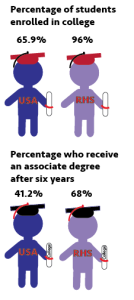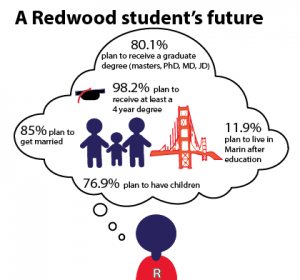Two years ago, when Thomas Conneely pictured what his life would be like in 2015, he thought he would be studying at UC Santa Cruz. Today, he is back at home.
“The best thing I have ever done was drop out from college,” said Conneely, who graduated from Redwood in 2012. “It was definitely hard to do. Here, it’s just, ‘College, college, college,’ and, ‘If you don’t go to college, what are you going to do with your life?’”

Conneely is not the only Redwood alum to decide college wasn’t a good fit. According to recent data compiled by a six-year tracking of Redwood students, more than three out of every 10 college-bound students from Redwood’s class of 2008 did not receive a degree within six years of graduating high school.
Redwood alumni have a significantly higher college graduation rate than students across the country.
This trend is certainly not isolated within the district, the county, or even the state. Only 56 percent of first-time college students across the country who began school in 2007 received degrees, according to the National Student Clearinghouse, the organization the Tamalpais Union High School District uses to track students. That is almost 14 percent lower than the rate of former Redwood students who were tracked in the same year.
Emily Friedricks, a Redwood class of 2011 graduate, took a gap year after high school and then began studying at Lewis and Clark College in Portland, Ore. She left before finishing her second semester.
“It was a beautiful college and an incredible experience,” Friedricks said. “But I realized that what I wanted to be doing was not being covered there. What I ended up doing was going to makeup school. And now I am a professional makeup artist. I decided to follow my passion and my talent. I am so much happier.”
Friedricks currently works as a sales associate for Space NK Apothecary at Marin Country Mart in Larkspur. She started working there immediately after she finished beauty school.
She said that the choice to drop out of college was difficult, but she loves where she works now.
“It was kind of scary. Especially coming from Marin, I feel like we are definitely encouraged to follow a linear path in a very certain manner. I was afraid of what my friends and family were going to say,” Friedricks said. “Ultimately, it was a huge relief and I believe I am going to be far more successful now.”

According to a recent Bark survey, 98.2 percent of current Redwood students think they will recent a bachelor’s degree or higher, which is over 25 percent higher than the 70.8 percent of the Redwood class of 2007 that received a degree within six years. Additionally, 80.1 percent of current students think they will obtain a graduate degree as well (Masters, PhD, MD, or JD).
Conneely said he felt an expectation to go to college and follow a certain path.
“I think at Redwood, they breed a culture that produces a sort of pressure on kids to conform or be molded into a path they are not necessarily comfortable with,” Conneely said. “[College] is talked about like some mythical place. College: All my questions will be answered. But it was pretty sad and lonely.”
Conneely dropped out nine months ago and now works teaching music lessons, as well as performing at venues with his band.
“I’m not killing it in any way. I have been living at my parents’ house for six months. It’s not super glamorous or anything,” Conneely said. “I got lucky. I scored a job teaching music. It’s really good money and really fun. I gig a lot. We play shows a couple of times a week. We go on tours a lot, sell CDs out of the back of our cars. It’s as simple as that.”
Connelly said that the main reason he decided to leave college was that he felt it was not facilitating his career as a musician.
“I found nothing for me there,” Connelly said. “College wasn’t providing the answers I was looking for. I didn’t find it hard, or challenging, or engaging, and I was spending a lot of money to learn things that I could learn on my own.”
On average, a smaller percentage of college students graduate college in the United States than that of many European nations. The United States’ college graduation rate is 20 percent lower than Iceland and the Slovak Republic, and almost 30 percent lower than Finland, according to the Organization for Economic Cooperation and Development.
Although renowned internationally for its higher education system, the United States has a fairly average graduation rate, giving out diplomas at around the median rate of member nations of the Organization for Economic Cooperation and Development.
While Conneely and Friedricks dropped out of college to pursue careers, there are many other reasons people may decide to drop out of college, according to College and Career Specialist Paula Vantrease.
“Personal reasons are probably why the bulk of students stop. Sometimes they just get burnt out,” Vantrease said.
She added that many students drop out for financial reasons.
“The economy is back on a upswing now, but for a while the economy had tanked out and students and their families did not have the money,” Vantrease said.
Conneely said he may have gotten more out of college if he had taken a break before.
“I’ve been going to school my entire life and never been taught to think outside of it. But there is a whole world out there,” Conneely said.
Conneely said that he has felt judgement from people in his community because of his decision.
“You definitely feel social stigma, like people look at you differently,” Conneely said. “People think I couldn’t handle college or that I am really dumb, when actually I just was not getting anything out of it.”
Friedricks has also found that people are skeptical about the path she has taken.
“Once I explain to them what I do and what my ambitions and goals are, they are pretty on board,” Friedricks said. “But I do feel like I have to overcompensate because people write me off as just kind of a slacker.”
Both Conneely and Friedricks have found it easy to find work. However, for many, the cost of not going to college is too high to drop out.
People with a bachelor’s degree or higher earn an average of $45,500 a year compared to the $28,000 a year that people with just a high school degree earn, according to a Pew Research study. Over a lifetime of earnings, that equates to a difference of more than one million dollars of income.






